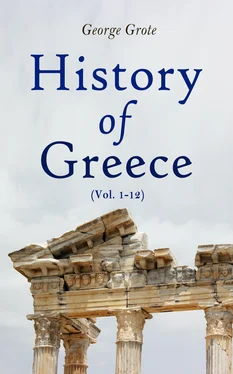George Grote - History of Greece (Vol. 1-12)
Здесь есть возможность читать онлайн «George Grote - History of Greece (Vol. 1-12)» — ознакомительный отрывок электронной книги совершенно бесплатно, а после прочтения отрывка купить полную версию. В некоторых случаях можно слушать аудио, скачать через торрент в формате fb2 и присутствует краткое содержание. Жанр: unrecognised, на английском языке. Описание произведения, (предисловие) а так же отзывы посетителей доступны на портале библиотеки ЛибКат.
- Название:History of Greece (Vol. 1-12)
- Автор:
- Жанр:
- Год:неизвестен
- ISBN:нет данных
- Рейтинг книги:5 / 5. Голосов: 1
-
Избранное:Добавить в избранное
- Отзывы:
-
Ваша оценка:
- 100
- 1
- 2
- 3
- 4
- 5
History of Greece (Vol. 1-12): краткое содержание, описание и аннотация
Предлагаем к чтению аннотацию, описание, краткое содержание или предисловие (зависит от того, что написал сам автор книги «History of Greece (Vol. 1-12)»). Если вы не нашли необходимую информацию о книге — напишите в комментариях, мы постараемся отыскать её.
History of Greece (Vol. 1-12) — читать онлайн ознакомительный отрывок
Ниже представлен текст книги, разбитый по страницам. Система сохранения места последней прочитанной страницы, позволяет с удобством читать онлайн бесплатно книгу «History of Greece (Vol. 1-12)», без необходимости каждый раз заново искать на чём Вы остановились. Поставьте закладку, и сможете в любой момент перейти на страницу, на которой закончили чтение.
Интервал:
Закладка:
We are not to be astonished if we find Aphroditê, in the Iliad, born from Zeus and Dionê,—and in the Theogony of Hesiod, generated from the foam on the sea after the mutilation of Uranos; nor if in the Odyssey she appears as the wife of Hêphæstos, while in the Theogony the latter is married to Aglaia, and Aphroditê is described as mother of three children by Arês. 116The Homeric hymn to Aphroditê details the legend of Aphroditê and Anchisês, which is presupposed in the Iliad as the parentage of Æneas: but the author of the hymn, probably sung at one of the festivals of Aphroditê in Cyprus, represents the goddess as ashamed of her passion for a mortal, and as enjoining Anchisês under severe menaces not to reveal who the mother of Æneas was; 117while in the Iliad she has no scruple in publicly owning him, and he passes everywhere as her acknowledged son. Aphroditê is described in the hymn as herself cold and unimpressible, but ever active and irresistible in inspiring amorous feelings to gods, to men, and to animals. Three goddesses are recorded as memorable exceptions to her universal empire,—Athênê, Artemis, and Hestia or Vesta. Aphroditê was one of the most important of all the goddesses in the mythical world; for the number of interesting, pathetic and tragical adventures deducible from misplaced or unhappy passion was of course very great; and in most of these cases the intervention of Aphroditê was usually prefixed, with some legend to explain why she manifested herself. Her range of action grows wider in the later epic and lyric and tragic poets than in Homer. 118
Athênê, the man-goddess, 119born from the head of Zeus, without a mother and without feminine sympathies, is the antithesis partly of Aphroditê, partly of the effeminate or womanized god Dionysos—the latter is an importation from Asia, but Athênê is a Greek conception—the type of composed, majestic and unrelenting force. It appears however as if this goddess had been conceived in a different manner in different parts of Greece. For we find ascribed to her, in some of the legends, attributes of industry and home-keeping; she is represented as the companion of Hêphæstos, patronizing handicraft, and expert at the loom and the spindle: the Athenian potters worshipped her along with Promêtheus. Such traits of character do not square with the formidable ægis and the massive and crushing spear which Homer and most of the mythes assign to her. There probably were at first at least two different types of Athênê, and their coalescence has partially obliterated the less marked of the two. 120Athênê is the constant and watchful protectress of Hêraklês: she is also locally identified with the soil and people of Athens, even in the Iliad: Erechtheus, the Athenian, is born of the earth, but Athênê brings him up, nourishes him, and lodges him in her own temple, where the Athenians annually worship him with sacrifice and solemnities. 121It was altogether impossible to make Erechtheus son of Athênê,—the type of the goddess forbade it; but the Athenian mythe-creators, though they found this barrier impassable, strove to approach to it as near as they could, and the description which they give of the birth of Erichthonios, at once un-Homeric and unseemly, presents something like the phantom of maternity. 122
The huntress Artemis, in Arcadia and in Greece proper generally, exhibits a well-defined type with which the legends respecting her are tolerably consistent. But the Ephesian as well as the Tauric Artemis partakes more of the Asiatic character, and has borrowed the attributes of the Lydian Great Mother as well as of an indigenous Tauric Virgin: 123this Ephesian Artemis passed to the colonies of Phokæa and Milêtus. 124The Homeric Artemis shares with her brother Apollo in the dexterous use of the far-striking bow, and sudden death is described by the poet as inflicted by her gentle arrow. The jealousy of the gods at the withholding of honors and sacrifices, or at the presumption of mortals in contending with them,—a point of character so frequently recurring in the types of the Grecian gods,—manifests itself in the legends of Artemis: the memorable Kalydônian boar is sent by her as a visitation upon Œneus, because he had omitted to sacrifice to her, while he did honor to other gods. 125The Arcadian heroine Atalanta is however a reproduction of Artemis, with little or no difference, and the goddess is sometimes confounded even with her attendant nymphs.
The mighty Poseidôn, the earth-shaker and the ruler of the sea, is second only to Zeus in power, but has no share in those imperial and superintending capacities which the Father of gods and men exhibits. He numbers a numerous heroic progeny, usually men of great corporeal strength, and many of them belonging to the Æolic race: the great Neleid family of Pylus trace their origin up to him; and he is also the father of Polyphêmus the Cyclôps, whose well-earned suffering he cruelly revenges upon Odysseus. The island of Kalaureia is his Dêlos, 126and there was held in it an old local Amphiktyony, for the purpose of rendering to him joint honor and sacrifice: the isthmus of Corinth, Helikê in Achaia, and Onchêstos in Bœotia, are also residences which he much affects, and where he is solemnly worshipped. But the abode which he originally and specially selected for himself was the Acropolis of Athens, where by a blow of his trident he produced a well of water in the rock: Athênê came afterwards and claimed the spot for herself, planting in token of possession the olive-tree which stood in the sacred grove of Pandrosos: and the decision either of the autochthonous Cecrops, or of Erechtheus, awarded to her the preference, much to the displeasure of Poseidôn. Either on this account, or on account of the death of his son Eumolpus, slain in assisting the Eleusinians against Erechtheus, the Attic mythes ascribed to Poseidôn great enmity against the Erechtheid family, which he is asserted to have ultimately overthrown: Theseus, whose glorious reign and deeds succeeded to that family, is said to have been really his son. 127In several other places,—in Ægina, Argos and Naxos,—Poseidôn had disputed the privileges of patron-god with Zeus, Hêrê and Dionysos: he was worsted in all, but bore his defeat patiently. 128Poseidôn endured a long slavery, in common with Apollo, gods as they were, 129under Laomedôn, king of Troy, at the command and condemnation of Zeus: the two gods rebuilt the walls of the city, which had been destroyed by Hêraklês. When their time was expired, the insolent Laomedôn withheld from them the stipulated reward, and even accompanied its refusal with appalling threats; and the subsequent animosity of the god against Troy was greatly determined by the sentiment of this injustice. 130Such periods of servitude, inflicted upon individual gods, are among the most remarkable of all the incidents in the divine legends. We find Apollo on another occasion condemned to serve Admêtus, king of Pheræ, as a punishment for having killed the Cyclôpes, and Hêraklês also is sold as a slave to Omphalê. Even the fierce Arês, overpowered and imprisoned for a long time by the two Alôids, 131is ultimately liberated only by extraneous aid. Such narratives attest the discursive range of Grecian fancy in reference to the gods, as well as the perfect commingling of things and persons, divine and human, in their conceptions of the past. The god who serves is for the time degraded: but the supreme god who commands the servitude is in the like proportion exalted, whilst the idea of some sort of order and government among these superhuman beings was never lost sight of. Nevertheless the mythes respecting the servitude of the gods became obnoxious afterwards, along with many others, to severe criticism on the part of philosophers.
The proud, jealous, and bitter Hêrê,—the goddess of the once-wealthy Mykênæ, the fax et focus of the Trojan war, and the ever-present protectress of Jasôn in the Argonautic expedition, 132—occupies an indispensable station in the mythical world. As the daughter of Kronos and wife of Zeus, she fills a throne from whence he cannot dislodge her, and which gives her a right perpetually to grumble and to thwart him. 133Her unmeasured jealousy of the female favorites of Zeus, and her antipathy against his sons, especially against Hêraklês, has been the suggesting cause of innumerable mythes: the general type of her character stands here clearly marked, as furnishing both stimulus and guide to the mythopœic fancy. The “Sacred Wedding,” or marriage of Zeus and Hêrê, was familiar to epithalamic poets long before it became a theme for the spiritualizing ingenuity of critics.
Читать дальшеИнтервал:
Закладка:
Похожие книги на «History of Greece (Vol. 1-12)»
Представляем Вашему вниманию похожие книги на «History of Greece (Vol. 1-12)» списком для выбора. Мы отобрали схожую по названию и смыслу литературу в надежде предоставить читателям больше вариантов отыскать новые, интересные, ещё непрочитанные произведения.
Обсуждение, отзывы о книге «History of Greece (Vol. 1-12)» и просто собственные мнения читателей. Оставьте ваши комментарии, напишите, что Вы думаете о произведении, его смысле или главных героях. Укажите что конкретно понравилось, а что нет, и почему Вы так считаете.












